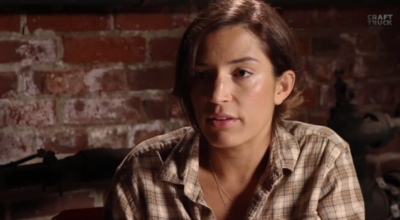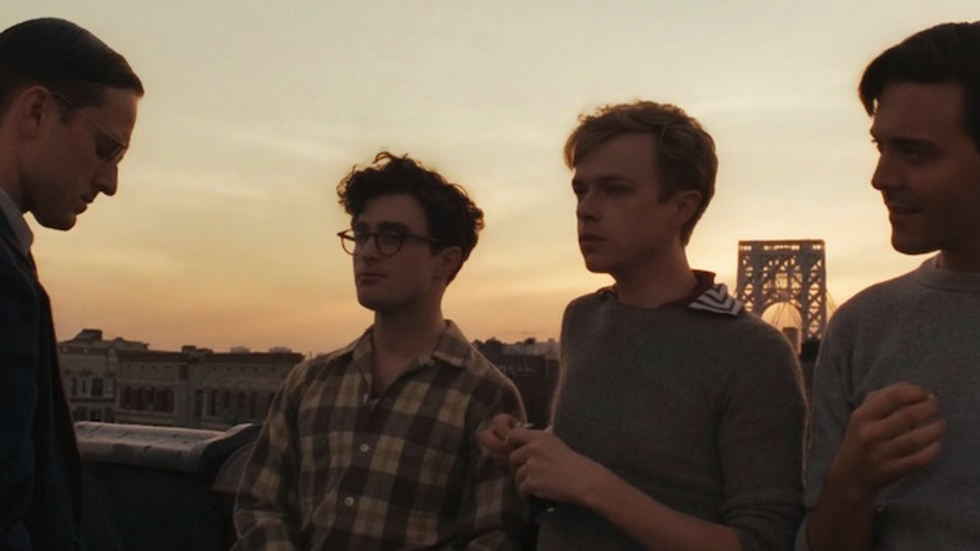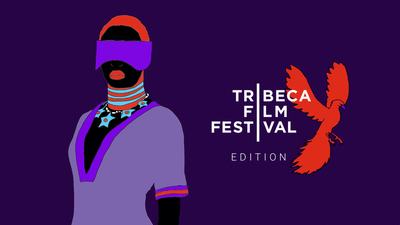
BY ZACHARY WIGON |
Interview: John Krokidas on His Beat Movement Origin Story 'Kill Your Darlings'
'Kill Your Darlings' is a look at the young people who would go on to start the most famous literary movement of the 20th Century. We talked to director John Krokidas about how he pulled off an intimate, relatable period piece that feels completely current.

Basically an "origin story" about the Beats, Kill Your Darlings, which opens today, follows a few young writers - Allen Ginsberg (Daniel Radcliffe), William S. Burroughs (Ben Foster), Jack Kerouac (Jack Huston) and one Lucien Carr (Dane DeHaan) - in 1940s New York as they attend Columbia University and try to find their artistic voices.
Radcliffe anchors the film as Ginsberg, seen here not as a the demonstrative poet with the expressive beard, but rather an insecure kid just trying to make some cool friends upon arriving at college. There's something touching about seeing such larger-than-life literary legends reduced to human scale, but Kill Your Darlings pushes against the expectations of a more traditional biopic by Krokidas' stylistic ambitions, which cover a gamut of film noir, French New Wave, and '90s music-video influences, forming an intoxicating melange that makes the film as vivaciously aggressive as the drugs its characters are perpetually ingesting.
Keeping things tense, Krokidas introduces a (true) element to his narrative that is often unremarked-upon in the larger narrative of how the Beats came to be: that Lucien Carr, who brought many of the movement's figures together, was engaged in an obsessive and potentially dangerous relationship with an older man named David Kammerer (played by Michael C. Hall).
Combining mystery and suspense with a bildungsroman, Krokidas has created an arresting debut that seems bound to receive some recognition come awards season. I had the chance to sit down with Krokidas recently and discuss the film.
Tribeca: What's the history of how the project came to be?
John Krokidas: My best friend and college roommate, Austin Bunn, was a short story writer and playwright. Right after I got out of film school he told me that he had the best idea for a play - the story of this murder that inspired the Beats to start their revolution. I had never heard the story before. As he told it to me I was seeing flashes of the movie version in my head, and so I used my evil powers of manipulation to convince him that it would make a horrible play but a wonderful movie, and that we had to write it together.
Tribeca: What's it like, writing a story with such larger-than-life characters? To what degree are you trying to maintain fidelity to the mythology of these figures?
John Krokidas: We heavily researched this movie. We started off not just going through the biographies and the New York Times records of the murder back in the '40s, but we also went to the Ginsberg Archives at Stanford and even got into Jack Kerouac's old college apartment - the Columbia students living there didn't even know it used to be his place! So we got to really experience the feel of what their lives were like.
But it comes to a point when - you know, there's so much biographical information about these guys, we decided to not be overwhelmed and feel that we had to show who they would become in life. We wanted to just focus on the awkward phase that everyone goes through when they're 18, 19 years old. We decided to cut the story off at 1945 and not do "Allen Ginsberg" with a double-underline.
As you get older, you realize it's the artists you worship in high school and college that stick with you forever.
We wanted to look at a kid named Allen Ginsberg from Paterson, New Jersey, whose father was a poet and whose mother was emotionally ill, a kid who got into Columbia and didn't know what he wanted to do with his life until he met Lucien Carr. I even had these moments with the actors, because Jack Huston was like, wow, I'm playing Jack Kerouac, and I said no you're not. You're playing a guy named Jack who's at Columbia on a football scholarship, but he wants to join the Merchant Marines so he can travel the world and get life experience for his new book. It's an origin story.
Tribeca: What was the impact of the Beats on your life, personally?
John Krokidas: I was a closeted gay kid in the '90s in suburban Connecticut, and I remember the reaction to someone anonymously coming out to the school newspaper was, "Who's the fucking faggot? We're going to kill him." I knew I had to just pretend, I wasn't able to fully be who I wanted to be, and I was hoping that one day I would go to college and be able to be who I wanted to be then.
I remember someone mentioning Allen Ginsberg in a derogatory way, and I thought, who is this guy? So I went to the local bookstore and checked out his poetry for the first time. He was so brave with his sexuality and his passions and his politics, and I remember wishing I could be that brave myself. As you get older, you realize it's the artists you worship in high school and college that stick with you forever. When you need that comfort music, you go back to those three albums you were obsessed with back then. So these guys have always held a special place in my heart.
Tribeca: The opening sequence of the film - the way you insert the title of the film in such a stylized fashion - was quite a grabber. In general the film has a freewheeling stylistic approach. What was your stylistic approach like?
John Krokidas: Well, I remember listening to the Criterion Collection commentary on The Ice Storm, and the DP Fred Elms was talking about how he made a huge fifty-page book about the 1970s in order to do the film. Everything from color palettes to fonts. I did that with the 1940s. The year that this movie takes place - 1944 - was the year Double Indemnity won Best Picture. It's the year of Laura and Gilda. It's the high point for American film noir. In the writing process, I turned to Austin and said, why not structure this as a noir? The jail scene that opens the film, I figured, why not start it with a heightened moment of passion? So the idea of doing something with film noir styling was always one of my original impulses, but I thought an academic recreation of film noir would be really boring - I didn't want to just show that I was a good film student, I wanted to personalize it.
Just because of the nature of shooting it in 24 days, it became really young and fast and rebellious.
I thought about, what's the arc of this movie? It's going from a place of conformity to non-conformity, in terms of the characters - and I thought that would be a great arc in terms of the camerawork. And of course, where did film noir go when it got in the hands of the French? It became the New Wave. So I said, there we go - once these guys meet each other and go down the rabbit hole, let's take the camera off the tripod and create a freer, handheld style to reflect their burgeoning voices and reflect the shift from film noir to the New Wave. So I explained that to all the department heads before we started filming.
But then, something really cool and magical happens once you start filming, which is that you realize you've hired incredibly talented people, and in order to get the best out of them, you can't just force them to do what you wrote down on the page, you also need them to put their own imagination into the project. It's like, they know the rules, but they fill things in with their own personal ideas and vision. This movie, just because of the nature of shooting it in 24 days, it became really young and fast and rebellious because of our schedule.
Reed has the speed of a documentary cameraperson, but also the intuition of how to follow the actors or the props for the story to move forward.
You know, it's like you have this child in your head, and after a while you start to see that the child is having its own voice, and you just have to let it be what it's going to be. One of the best things about working with Christine Vachon was that she's a real director's producer - she would watch the cuts and say John, I love what you're doing, do you have any bold moves you want to make? Don't be afraid. Make bold choices.
Having that encouragement behind me is what let me go, let's do a really bold move with the title sequence. Let's do something strong and young and brash and shocking, something that works both with and against the idea of doing a period piece. We didn't want this to feel old and stodgy - we wanted to tell a story of young people becoming artists from the perspective of those young people themselves. We even looked at some of Ryan McGinley's photography for inspiration, the way he shoots youth.
Tribeca: There's a creaminess to the images that reminds me of him - Reed Morano is a great DP.
John Krokidas: She's the best. She brought so much to this film - she went to NYU, as did I, and I feel like so many of us who went to NYU were trained in this documentary, neo-realist style. Reed has the speed of a documentary cameraperson, but also the intuition of how to follow the actors or the props for the story to move forward. She had this ability to create mood with lighting and low-contrast, and the smokiness, to bring the 1940s to life in a way that makes you feel like you're really there.
Tribeca: You're also extremely good at making scenes work - you often do this thing where you'll have a few different elements operating simultaneously in a scene, commenting on one another. Like in the scene at the jazz club where the guys are talking about their art, and in the background a woman is singing - and then the two things start intercutting really strongly.
John Krokidas: You're talking about something that's so instinctual, I'm not even quite sure I can articulate it! I mean, we shot this movie so fast, you have to just go with your gut. When you do that, you tend to go toward things that are organically yours. Or perhaps that's just my ADD manifesting itself in my filmmaking.

